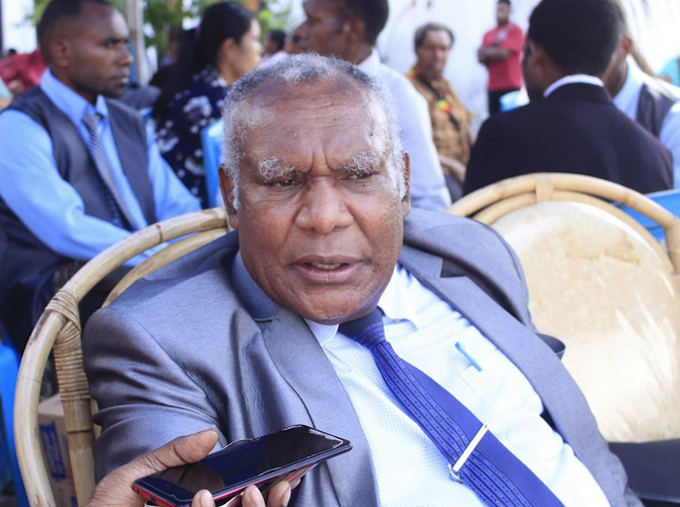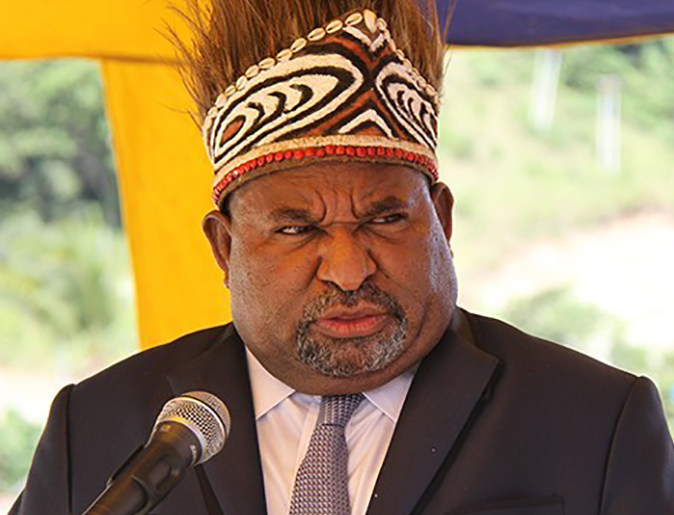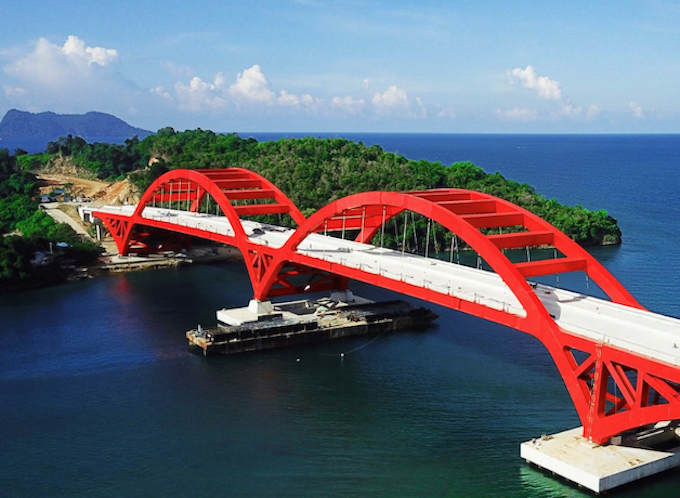SPECIAL REPORT: By Yamin Kogoya
Alleged corruption involving Governor Lukas Enembe has dominated both Papuan and Indonesian media outlets and social media groups over the past two weeks.
The Indonesian media is rife with allegations and accusations against the governor who is suspected of spending of billions in rupiahs.
These media storms are sparked by allegations against him of receiving gratification worth Rp 1 million (NZ$112,000).
Governor Enembe was named a suspect by the Indonesian Corruption Eradication Commission (KPK) last week and summoned on Monday, September 19, by Police Mobile Brigade Corps (BRIMOB) headquarters in Kota Raja, Jayapura Papua.
Due to illness, the governor was unable to attend the summons. Only his lawyers and Papuan protesters attended, who then condemned KPK of being unprofessional in handling the case.
Papuans (governor’s supporters) take this case as another attempt by the state to “criminalise” their leader motivated by other political agendas, while Jakarta continues to push the narrative of the case, being a serious crime with legal implications.
According to Dr Roy Rening, a member of governor’s legal team, the governor’s designation as a suspect was prematurely determined. This is due to the lack of two crucial pieces of evidence necessary to establish the legitimacy of the charge within the existing framework of Indonesia’s legal procedural code.
Unaware he was a suspect
Dr Rening also argued that the KPK’s behaviour in executing their warrant turned on a dime. The Governor was unaware that he was a suspect, and he was already under investigation by the KPK when he was summoned to appear.
In his letter, Dr Rening explained that Governor Enembe had never been invited to clarify and/or appear as a witness pursuant to the Criminal Procedure Code. The KPK instead declared the Governor a suspect based on the warrant letters, which had also changed dates and intent.
The manner in which the KPK and the state are handling the case involving Papua’s number one man in Indonesia’s settler colonial province has sparked a mass demonstration with the slogan “Save Lukas Enembe” from criminalisation.
The Governor’s case has generated a flurry of news stories with all kinds of new allegations by the nation’s most prominent figures.
Mohammad Mahfud Mahmodin, commonly known as Mahfud MD, Coordinating Minister for Political, Legal, and Security Affairs, accused Governor Enembe of corruption, amounting to billions of rupiahs during a public media conference held at the Coordinating Ministry Office, Jakarta, on Monday.
His allegations have sparked a backlash from the Governor and his lawyers, as well as from the Papuan people.
Governor’s lawyer Dr Rening said Mahfud MD should not be included in the technical part of the investigation, particularly when in relation to those financial figures. Dr Rening said any confidential information was already protected by the constitution and it was inappropriate for Mahfud MD to make such announcement.
He asked which case the minister Mahfud MD was referring to in his allegation because the actual case involving the KPK investigation only related to a gratuity of 1 billion Rp.
‘Massive campaign to undermine Governor Enembe’
Dr Rening asked how Mahfud MD could explain the other charges that were not included in the dispute of this case, adding that “we are still of the opinion, as I have mentioned in my articles, that ‘This is what we call a systematic, structured, and massive campaign to undermine the honour and reputation of Papuan leader Lukas Enembe’.
“Governor Enembe himself has also rejected the allegations involving the spending of billions of rupiah, accusing Mahfud MD of making false allegations against him.”

Reverend Dr Sofyan Yoman, president of the Papuan Baptist Church Alliance, stated on the same day as Mahfud MD’s press conference that it would be remembered as the day the KPK lost its integrity and legitimacy as an independent institution for the protection of the nation’s morale.
He said it would be recorded that 19 September 2022 was the day of the “death” of the Corruption Eradication Commission (KPK).
“Therefore, I express my condolences for the passing of the KPK. So, the history of the KPK is over,” reported Tabloid Jubi.
At the press conference, Mahfud MD was accompanied by Alexander Marwata (KPK), Ivan Yustiavandana, director of the Financial Transaction Reports and Analysis Centre (PPATK), and other representatives from the State Intelligence Agency (BIN), National Police, and the Armed Forces were also present.
By engaging in this collaboration, the KPK lacked an independent voice, and its integrity and legitimacy were shattered by state intervention.
Jakarta’s ‘state of panic’
Reverend Yoman’s “condolence” statement about the KPK was the result of the state intervention in suffocating KPK’s ability to stand independently.
Reverend Yoman added: “Jakarta is in a state of panic right now because gross human rights violations in the land of Papua are already being recognised by international institutions such as the UN, European Union, Pacific Island forums (PIF) and Africa Caribbean Pacific nation states (ACP).
“Governor Lukas Enembe’s case is not the real issue,” he said.
In reality, this was “merely a façade designed by Jakarta” to distract the public from paying attention to the real issue, which was the state’s crimes against West Papuans, reported Papua.tribunnews.com.
Natalius Pigai, a prominent Indigenous Papuan figure in Indonesia and former human rights commissioner, wrote on Twitter: “There is no single law that authorises Mahfud MD to lead a state auxiliary body. The coordinating minister can only lead police and prosecutors as part of the cabinet, he cannot act as Head of State. It was a silly intervention that weakened the KPK, and strengthened accusations of political motivations toward Lukas Enembe.”
Despite this condemnation and rejection from the governor’s camp, Governor Lukas Enembe remains a suspect waiting to be investigated by the KPK. The KPK’s Deputy Chair, Alexander Marwata said KPK examined a number of witnesses before establishing Enembe as a suspect.
“Several witnesses have clarified, and documents have been obtained that give us reason to believe there is enough evidence to establish a suspect” reported Kompas.com.
Papuans protect residence
Meanwhile, the Governor’s private residence in Papua is being protected by Papuans, triggering more security personnel being deployed in a region that is already one of the most highly militarised in the Asia Pacific.
Papua’s people have been shaken by the news of this corruption allegation against their Governor.
According to Paskalis Kosay, Papua is worried about the loss of Lukas Enembe, a unifying figure among the Papuan people.
He added: “Papua’s political situation has become increasingly unhealthy since Mahfud MD’s statement. The internet — particularly social media platforms like Twitter, Facebook, and WhatsApp — are full of both positive and false information. Also, its contents may be used to slander, humiliate, or discredit the good name, honour, or dignity of a certain person, figure, or group.
“We should be vigilant when paying attention to the different information spread on social media and other mass lines. It is imperative that Papuans filter all news content very carefully. You must then respond wisely, intelligently, and proportionally so as not to be accused of being a member of a group of disseminators of misleading information”.
Meanwhile, as Governor Enembe awaits the outcome of the case against him, he has already missed his medical appointments in Singapore. This could unleash unprecedented protests throughout West Papua if or when his health fails him due to him being blocked by Jakarta from leaving the country.
A failure to protect the Governor while he is caught up in the limbo of the Indonesian legal system, would have catastrophic consequences for Jakarta. Papuans have already warned Jakarta “don’t try [to detain him] during the protests.”
As of today, the Governor’s and his family’s bank accounts remain blocked, a decision made by the state without their knowledge a few months ago, that has led to the current crisis.
Who is Governor Lukas Enembe?
Governor Lukas Enembe is a symbol of pride and an icon for the sons and daughters of the Koteka people of the highlands of Papua. He is often referred to as “Anak Koteka” (son of Koteka).

Koteka as a horim, or penis gourd or sheath, traditionally worn by males in Papua’s Highlands, where Governor Enembe comes from.
When he is called “Anak Koteka” it means that he is a son of cultural groups that wear this traditional attire. Knowing this is critical to understanding how and why this man became such a central figure in West Papua.
Before he became Governor of Papua in 2013, the Koteka people of the Highlands faced many kinds of racial prejudice and discrimination. Wearing the koteka was seen as a symbol of primitiveness, backwardness, and stupidity.
Lukas Enembe turned the symbol of the koteka into hope, pride, courage, leadership, and power when he became governor for two consecutive terms. He broke barriers no one else had crossed, exposed cultural taboos, and used his ancestral wisdom to unite people from every walk of life.
As the Highland’s first Papua Governor (2013 -2023), he upended stereotypes associated with his cultural heritage.
Governor Enembe was born in Timo Ramo Village, Kembu District, Tolikara Regency of Papua’s Highlands on 27 July 1977. His biography A Statesman from Honai, by Sendius Wonda, states that Lukas grew up in a simple family.
He attended elementary school in Mamit (1974-1980) and junior high school in Sentani (1980-1983). He then attended senior high school in Sentani from 1983-86.
Sacred building for sharing wisdom
In Highlands Papua, honai is a traditional hut, but it is more than just a hut; it is a sacred building where ancient teachings and wisdoms are discussed and preserved.
Honai shaped him into the person he is today. In the 1980s, he was one of only a handful of Papuan Highlands village children to study in urbanised coastal regions.
His determination to continue his studies was already noted by his peers. In 1986, he took the selection examination for admission to Indonesia’s State Universities and was accepted as a student at Sam Ratulangi University (Unsrat) Manado Indonesia.
As a fourth-semester student at the FKIP Campus, Enembe majored in political science at the Faculty of Social and Political Sciences in Manado. After completing his studies in Manado in 1995, Lukas returned to Papua.
As he waited for acceptance of his Civil Service Candidates (CPNS) he lived in Doyo Sabron, Jayapura Regency with his wife, Yulce Wenda, and his family. The following year, he was accepted as a civil servant (PNS).
He aspired to become a lecturer at Cenderawasih University, Jayapura, where he earned 22 citations for local government lectures. The promise of being a lecturer ran aground during the pre-service announcement, and Enembe was assigned a position as a civil servant at the Merauke Regency Socio-Political Affair’s Office instead.
During 1998-2001, Enembe was sent by a missionary agency to continue his studies for two years at the Cornerstone Christian college in Australia (Dubbo, NSW). Upon returning from Australia in 2001, he participated in the Puncak Jaya regional election, but his dream of becoming a regent was dashed.
‘Papua rising’
From 2001-2006, he served as Deputy Regent of Puncak Jaya alongside Elieser Renmaur. In 2006, Enembe was elected chair of the DPD of the Papua Province Democratic Party. In that year he also attempted to run for Governor of Papua by collaborating with a Muslim couple, Ahmad Arobi Aituarauw.
He lost the vote, however, and Bas Suebu-Alex Hasegem won. Last but not least, he participated in the 2007 Puncak Jaya regional election and was elected Regent of Puncak Jaya along with Henock Ibo.
In 2013, Enembe and Klemen Tinal ran as candidates for Governor of Papua in the 2013 Papuan Gubernatorial Election.
The General Elections Commission (KPU) appointed Lukas Enembe and Klemen Tinal to lead Papua between 2013 and 2018. In 2018, he was re-elected along with Klemen Tinal to serve as Governor of Papua for the period 2018-2023.
“Papua rising, independent, and prosperous” was Lukas’s vision for leading Papua through the landslide victory.
As Governor he gave 80 percent of the special autonomy funds to regional and city areas, and 20 percent to the provinces. In his view, 80 percent of the special autonomy funds are managed by districts or cities which is where most people in Papua live.
Papua has undergone a lot of development during Enembe’s governorship, including the construction of a world-class sports stadium that has been named after him, as well as other major projects like the iconic Youtefa Bridge in Jayapura city.

Papuans ‘need to live’
Many Papuans opposing Jakarta’s activities in West Papua consider him to be a father figure. When asked about the conditions his people face on national television, Governor Enembe responded by saying “Papuans do not need development, they need to live.”
Such bold statements, along with others he made directly challenge Indonesia’s mainstream narrative, since Jakarta and Indonesians at large regard “development” as a panacea for West Papua’s problem.
Jakarta is also suspicious about the hundreds of Papuan students sent abroad under the scholarship scheme he designed using Special Autonomy Funds.
His boldness, style of leadership and deeds indicate that there is a deep longing in his heart for justice and for better treatment of his fellow humans. His accomplishments distinguish him as a pioneer, a dreamer, a fighter, a survivor, and a practical man with deep compassion for others.
It is this spirit that keeps him alive and strong despite the physical and psychological intimidation, threats, as well as clinical sickness he has endured for years.
The rest of his term (2022-2023) is one of the most critical times for him. After more than 20 years as Indonesia’s top public servant, the strong man of the people is facing his greatest challenge as he enters his final year in his career.
How that final chapter of his career ends will be determined by the outcome of this corruption allegations case, which could have significant consequences for Papua and Indonesia as well as for Governor Enembe.
Jakarta must think carefully in how they handle the governor, son of Koteka.
Yamin Kogoya is a West Papuan academic who has a Master of Applied Anthropology and Participatory Development from the Australian National University and who contributes to Asia Pacific Report. From the Lani tribe in the Papuan Highlands, he is currently living in Brisbane, Queensland, Australia.
Article by AsiaPacificReport.nz






